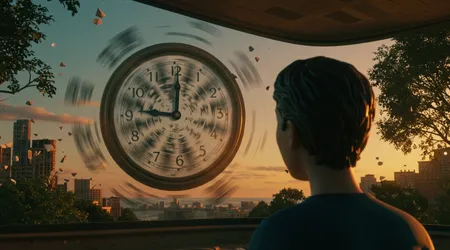Why Time Might Not Be What We Think It Is

Time might not be what we think it is a concept so familiar yet maddeningly elusive. From the tick of a clock to the rhythm of our lives, time shapes how we perceive reality.
Anúncios
But what if our understanding of time is a fragile construct, built on assumptions that don’t hold up under scrutiny?
Scientists, philosophers, and thinkers have long wrestled with time’s true nature, and recent discoveries in physics and cosmology are unraveling its mysteries.
This article dives into why time might not be what we think it is, exploring groundbreaking ideas, real-world implications, and the cosmic questions that keep us awake at night.
Could time be an illusion, a dimension, or something entirely stranger? Let’s embark on this journey to uncover the truth.
Time’s enigma captivates us because it’s both intimate and incomprehensible. We measure it with precision, yet its essence slips through our fingers.
In 2025, advances in quantum mechanics and cosmology are reshaping our view of time. From Einstein’s relativity to cutting-edge theories about the universe’s structure, the idea that time might not be what we think it is challenges our deepest assumptions.
This exploration isn’t just academic it touches how we live, plan, and dream. By peeling back time’s layers, we’ll uncover insights that could redefine our place in the cosmos.
Time as a Human Construct
Clocks tick, calendars flip, but time’s flow might be a human invention. Our brains organize experiences into past, present, and future, creating a linear narrative.
Yet, physics suggests this linearity is deceptive. Einstein’s theory of relativity, introduced in 1915, showed time is relative, stretching or contracting based on speed and gravity.
A clock on a spaceship ticks slower than one on Earth. This isn’t science fiction it’s measurable.
Consider astronauts on the International Space Station. They age slightly slower due to time dilation, a real effect of relativity.
++ Could Black Holes Be Gateways to Other Universes?
In 2023, NASA’s studies confirmed this phenomenon, with atomic clocks in orbit losing microseconds compared to Earth-bound ones.
If time bends under physical conditions, is it truly fixed? The notion that time might not be what we think it is gains traction here.
Our daily lives reinforce a rigid view of time. Work schedules, deadlines, and birthdays anchor us to its march. But cultures perceive time differently some see it as cyclical, not linear.
This diversity hints that time’s structure is partly a human lens, not universal truth. If our perception shapes time, what’s its true essence?

Time in the Quantum Realm
Zoom into the subatomic world, and time gets weirder. Quantum mechanics, the science of particles, challenges our classical view of time’s flow.
Particles can exist in multiple states simultaneously, only collapsing into one when observed. Does time behave similarly at this scale? Some physicists argue it might.
In 2024, a study published in Nature Physics explored time’s role in quantum systems. Researchers found that quantum entanglement where particles share special connections can blur the distinction between cause and effect.
Also read: Why Some Galaxies Don’t Seem to Have Dark Matter at All
If causality wobbles, so does our sense of time’s arrow. This suggests time might not be what we think it is at nature’s smallest scales.
Imagine a quantum event like a cosmic coin flip. Until observed, the outcome exists in a haze of possibilities.
Time, in this context, seems less like a river and more like a fog. Could time emerge only when we measure it? This idea shakes the foundation of our everyday experience.
The implications are profound. If time behaves differently in the quantum realm, our macro-level understanding calendars, clocks, history might be a simplified story.
Bridging quantum and classical time could unlock new technologies, like quantum computers that manipulate time’s rules.
Time and the Cosmos
Lift your gaze to the stars, and time’s mysteries deepen. The universe’s vastness makes time a cosmic puzzle.
At the Big Bang, 13.8 billion years ago, time as we know it began. But what was “before”? Physicists like Stephen Hawking argued time might loop or fold, eliminating a true beginning.
Recent cosmology research, including 2025 data from the James Webb Space Telescope, shows galaxies forming earlier than expected.
This challenges timelines of cosmic evolution, hinting that time might not be what we think it is in the universe’s infancy. Did time flow differently in the early cosmos?
Read more: Are There Stars Made Entirely of Dark Matter?
Picture a cosmic clock. Near a black hole, it slows to a crawl due to extreme gravity. Astronauts near one would see Earth’s future unfold rapidly.
This isn’t theoretical black hole time dilation is a proven effect. Time’s flexibility across the cosmos defies our intuition.
What about the universe’s end? Some theories suggest time could “stop” in a heat-death scenario, where entropy maxes out.
Others propose cyclical universes, where time resets. These ideas stretch our minds, suggesting time isn’t a straight line but a cosmic dance.
The Philosophical Angle
Beyond physics, philosophy probes time’s essence. Is it real or a mental construct? Augustine of Hippo, in the 4th century, famously said, “What is time?
If no one asks me, I know.” His words echo today. If time might not be what we think it is, philosophy offers clues.
Consider memory. We experience time through recollection and anticipation, but these are brain processes, not time itself.
Modern neuroscience shows our perception of time distorts under stress or focus. A 2024 study in Journal of Neuroscience found that intense focus can make seconds feel like minutes, suggesting time’s subjectivity.
Imagine waiting for a late train. Five minutes feels eternal, yet an hour with friends vanishes. This relativity isn’t just poetic it’s neurological.
If our minds shape time’s flow, is it an illusion? Philosophers like Kant argued time is a framework we impose on reality, not reality itself.
This perspective invites reflection. If time is partly a human construct, can we rethink it to live better?
Perhaps by embracing its fluidity, we could stress less about deadlines and savor the moment. Philosophy doesn’t solve time’s riddle but enriches the question.
Time in Everyday Life
Time’s mystery isn’t just for labs or lecture halls it shapes our lives. We plan, regret, and dream within its bounds. But if time might not be what we think it is, how does this affect us practically? Let’s explore an analogy: time as a river.
We see ourselves floating down this river, unable to stop or reverse. Yet, physics suggests the river could bend, split, or even loop.
Knowing this, we might approach life differently less rigid, more open to possibilities. A missed deadline isn’t the end; it’s a ripple.
For example, consider productivity apps. Tools like Notion or Todoist help us “manage” time, but they reinforce its linearity.
If we viewed time as malleable, we might prioritize flexibility over strict schedules. This shift could reduce stress and boost creativity.
Another example: aging. We fear time’s march because it brings decline. But if time’s flow isn’t fixed, could we reframe aging as growth, not loss?
This mindset, grounded in time’s fluidity, could transform how we live, work, and connect.
The Future of Time Research

Where is time research headed? In 2025, scientists are pushing boundaries. Quantum gravity theories aim to unify relativity and quantum mechanics, potentially redefining time.
Experiments at CERN and other facilities are testing time’s behavior at extreme scales.
One statistic underscores the stakes: a 2024 survey by Science magazine found 68% of physicists believe time’s fundamental nature remains unknown.
This uncertainty drives innovation. Future discoveries could lead to technologies like time-based navigation or even time manipulation.
Imagine a world where we harness time’s quirks. Navigation systems could account for relativistic effects, improving space travel.
Or consider medical applications could we slow biological time to extend life? These ideas, once sci-fi, are nearing reality.
The quest to understand time also sparks imagination. If time might not be what we think it is, what else have we misunderstood?
This question fuels curiosity, pushing science and philosophy forward. The future of time research promises answers and more questions.
Table: Key Theories of Time
| Theory | Core Idea | Implication |
|---|---|---|
| Relativity | Time dilates with speed and gravity | Time is not universal |
| Quantum Mechanics | Time may emerge from particle interactions | Time’s arrow is blurry at small scales |
| Block Universe | Past, present, future coexist | Time is an illusion |
| Cyclical Time | Time loops in cosmic cycles | No true beginning or end |
Frequently Asked Questions
Q: Is time travel possible if time isn’t what we think?
A: Relativity allows forward time travel via time dilation, as seen in astronaut studies. Backward travel remains speculative, requiring exotic matter.
Q: How does quantum mechanics change our view of time?
A: Quantum entanglement blurs causality, suggesting time might not flow linearly at subatomic scales, challenging our everyday perception.
This exploration of why time might not be what we think it is reveals a universe where time bends, blurs, and defies intuition. From relativity’s revelations to quantum enigmas, time’s true nature eludes us.
Yet, this mystery invites wonder. What if rethinking time could transform how we live?
As science advances, we edge closer to answers, but the journey itself full of questions and possibilities is what makes time so captivating.
